In today's tech-driven world, hiring a software engineer is not just about filling a vacancy; it's about strategically building your company’s future. Many companies often falter by either rushing the process or failing to understand the technical nuances of the role they're hiring for. A software engineer can be the cornerstone of your development team, bringing coding expertise as well as problem-solving capabilities to drive your projects forward.
This article guides you through the intricacies of hiring a software engineer, covering everything from understanding their role to structuring technical interviews. We’ll walk you through screening resumes, conducting skill assessments, and employing case studies for evaluation. For more insights on technical talent acquisition, visit our technical talent attraction guide.
Table of contents
What does a Software Engineer do?
A software engineer designs, develops, and maintains software applications, bringing ideas to life through code. They play a key role in creating software solutions that meet user needs and business objectives.
Software engineers engage in a variety of tasks, including:
- Analyzing user requirements to understand what needs to be developed.
- Designing software solutions that are scalable and maintainable.
- Writing clean and efficient code using various programming languages.
- Testing and debugging applications to ensure they function correctly.
- Collaborating with cross-functional teams, including designers and product managers, to deliver high-quality products.
To explore more about the skills required for this role, you can visit our detailed page on skills required for software engineers.
Software Engineer Hiring Process
Hiring a software engineer can be a streamlined process if approached with a structured plan. A typical timeline can span 1-2 months depending on the specifics of your recruitment strategy.
- Craft a Precise Job Description: Start with a well-defined software engineer job description and post it on relevant job platforms to attract suitable candidates.
- Resume Screening: Expect resumes to start coming in within the first week. Shortlist candidates who closely match the job requirements.
- Skill Assessment: Use customized coding tests to evaluate technical proficiency. This stage might take about a week.
- Interviews: Conduct an initial interview focusing on technical skills, followed by a second one for cultural fit.
- Decision and Offer: Finally, select the best candidate and extend an offer.
Overall, this process is designed to help you make an informed decision quickly. The timeline may vary, but a structured approach will ensure you find a fit for your team. In the subsequent sections, we'll delve into each step with detailed guidelines and resources.
Identifying Key Skills and Qualifications for Software Engineers
Hiring for software engineering roles can get tricky, especially when defining the candidate profile. What's essential for one company may merely be an advantage for another. For instance, while proficiency in React might be non-negotiable for some, your team might rely on a different framework.
To streamline your hiring process, it’s important to distinguish between required and preferred skills and qualifications. This clarity will help you attract the right talent while effectively filtering out candidates who may not fit your team's specific needs.
| Required skills and qualifications | Preferred skills and qualifications |
|---|---|
| Bachelor's degree in Computer Science, Engineering, or a related field | Master's degree in Computer Science or related field |
| Proficiency in at least one high-level programming language such as Java, Python, or C++ | Experience with cloud technologies such as AWS or Azure |
| Solid understanding of software development lifecycle and methodologies such as Agile or Scrum | Familiarity with front-end technologies like JavaScript, HTML, and CSS |
| Experience with version control systems such as Git | Knowledge of DevOps practices and CI/CD pipelines |
| Strong problem-solving and analytical skills | Experience in developing mobile applications |
How to Write an Effective Software Engineer Job Description
Once you've defined the ideal candidate profile, the next step is crafting a compelling job description to attract top talent. Here are some key tips for writing an effective Software Engineer job description:
- Highlight key responsibilities and impact: Clearly outline the role's main duties and how they contribute to company goals. This helps candidates understand their potential influence.
- Balance technical requirements with soft skills: List necessary programming languages and tools, but also emphasize communication and problem-solving abilities. A well-rounded candidate excels in both areas.
- Showcase your company's unique selling points: Highlight exciting projects, growth opportunities, or team culture. This helps your posting stand out and attracts candidates who align with your values.
- Keep it concise and scannable: Use bullet points and short paragraphs. This makes it easier for busy candidates to quickly grasp the key information and decide if they're a good fit.
Top 10 Platforms to Hire Software Engineers
Now that you've crafted a solid job description, the next step is to share it on job listing sites to find the right candidates. Posting on various platforms will help you reach software engineers with diverse skills and experience levels, ensuring you get the best match for your team.
LinkedIn Talent Solutions
Ideal for finding experienced software engineers across various industries. Offers extensive filtering options and allows direct outreach to passive candidates.

Indeed for Employers
Suitable for high-volume hiring across all experience levels. Provides access to a large pool of active job seekers and offers sponsored job postings for increased visibility.

Dice
Specialized in tech recruitment. Best for finding software engineers with specific skills or niche expertise. Offers targeted advertising to reach qualified candidates.
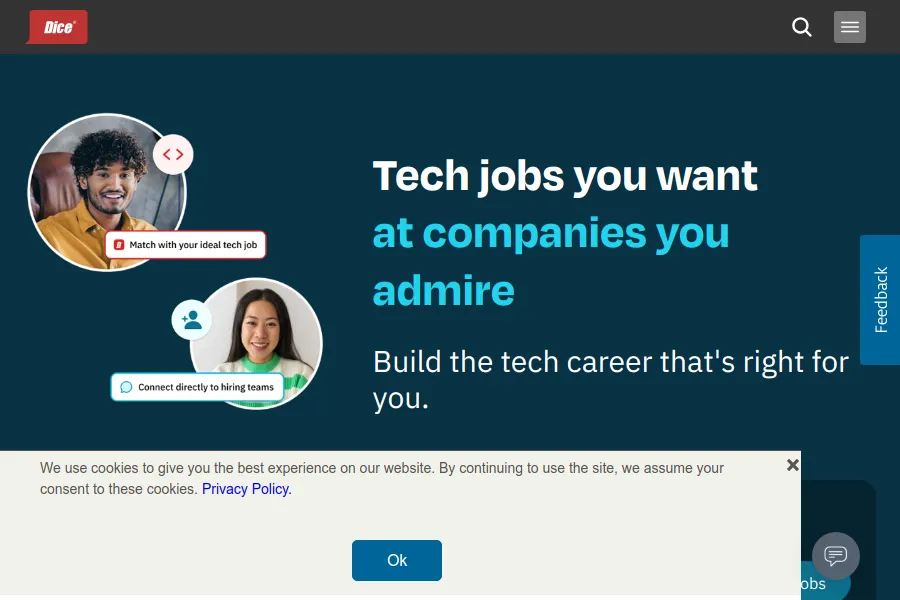
Among the remaining platforms, Upwork offers flexibility for hiring freelancers across different skill levels and project sizes. Stack Overflow Talent connects you with an active community of developers, offering both full-time and freelance opportunities. AngelList Talent is perfect for startups aiming to attract innovative candidates. Glassdoor for Employers combines job listings with a focus on employer branding. Hired is tailored for finding pre-screened tech talent, especially for remote roles. GitHub allows you to find software engineers passionate about open-source projects through their contributions. For more options in hiring, you might also consider exploring remote hiring strategies.
How to Screen Software Engineer Resumes?
Resume screening is a necessary step in hiring software engineers to ensure you focus on candidates who meet your requirements. It helps narrow down the pool to those who have the basic qualifications and skills needed for the role.
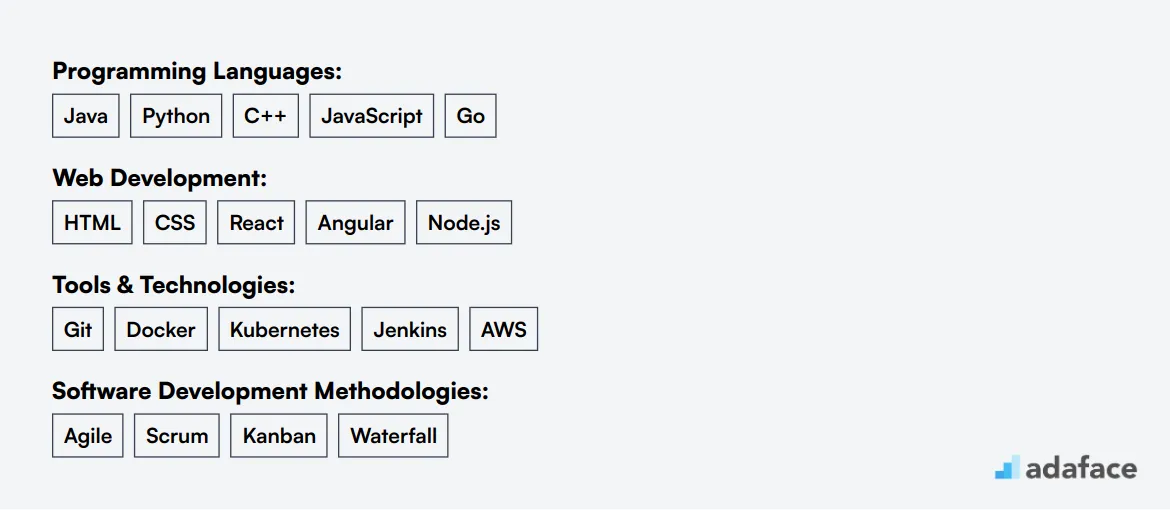
When manually screening resumes, look for keywords related to the role's required skills. For software engineers, you might search for terms like Java, Python, Agile, Git, and problem-solving. This quick scan can help you weed out applicants who don’t meet the basic criteria before moving on to more detailed evaluations.
Another approach is to leverage AI-driven tools, such as AI large language models, to automate the screening process. You can input a resume along with the job description and let the AI model highlight matching keywords, effectively filtering candidates that best fit the position.
Here's a sample prompt to use with an AI screening tool:
TASK: Screen resumes to match job description for software engineer role
INPUT: Resumes
OUTPUT: For each resume, provide following information:
- Email id
- Name
- Matching keywords
- Score (out of 10 based on keywords matched)
- Recommendation (detailed recommendation of whether to shortlist this candidate or not)
- Shortlist (Yes, No or Maybe)
RULES:
- If you are unsure about a candidate's fit, put the candidate as Maybe instead of No
- Keep recommendation crisp and to the point.
KEYWORDS DATA:
- Programming Languages (Java, Python, C++)
- Tools & Technologies (Git, Docker, AWS)
- Methodologies (Agile, Scrum)
To enhance your resume screening process, explore skills assessment tools and software engineering online tests.
Recommended Skills Tests for Assessing Software Engineers
Skills tests are a key part of evaluating software engineering candidates. They help you objectively assess technical abilities and problem-solving skills. Here are five tests we recommend for screening software engineers:
Software Engineering Test: This software engineering online test covers core concepts like data structures, algorithms, and system design. It's great for evaluating a candidate's overall software engineering knowledge.
Full Stack Developer Test: For roles requiring both frontend and backend skills, the full stack developer test assesses proficiency in various technologies across the stack. It helps identify well-rounded developers who can work on different parts of an application.
JavaScript Test: JavaScript is a must-know language for many software engineering roles. The JavaScript online test evaluates a candidate's proficiency in this versatile language, including ES6+ features and common frameworks.
Data Structures Test: Strong knowledge of data structures is fundamental for writing efficient code. The data structures online test assesses a candidate's understanding of arrays, linked lists, trees, and other key structures.
Coding Test: Practical coding skills are best evaluated through hands-on problems. Coding tests allow you to assess a candidate's ability to write clean, efficient code and solve real-world programming challenges.
Case Study Assignments to Evaluate Software Engineers
Case study assignments can be valuable tools for assessing software engineers, but they come with drawbacks. These assignments often lead to low completion rates and may cause top candidates to drop out due to their time-consuming nature. Despite these challenges, when used strategically, case studies can provide deep insights into a candidate's problem-solving abilities and technical skills.
System Design Challenge: This assignment asks candidates to design a scalable system architecture for a given problem. It tests their ability to make high-level design decisions, consider trade-offs, and explain their reasoning. This coding test can reveal a candidate's understanding of distributed systems and architectural patterns.
Code Refactoring Task: Candidates are presented with a poorly written codebase and asked to improve its structure, readability, and efficiency. This exercise evaluates their ability to work with existing code, identify issues, and apply best practices. It's particularly useful for assessing senior engineers who often need to maintain and upgrade legacy systems.
Feature Implementation Project: This assignment involves adding a new feature to an existing application. Candidates must write clean, well-documented code that integrates seamlessly with the current system. It tests their coding skills, attention to detail, and ability to follow specifications while working within an established codebase.
Structuring Technical Interviews for Software Engineers
After candidates pass the initial software engineer interview questions, it's time for technical interviews. These interviews are crucial for assessing a candidate's hard skills and problem-solving abilities. While skills tests help filter out unqualified candidates, technical interviews are key to finding the best fit for your team.
Here are some example technical interview questions for software engineers:
- Describe a challenging coding problem you've faced and how you solved it.
- How do you approach debugging a complex issue in a large codebase?
- Explain the concept of time complexity and give an example.
- What's your experience with version control systems?
- How do you ensure code quality and maintainability in your projects?
These questions help evaluate a candidate's problem-solving skills, coding practices, and technical knowledge.
How Much Does It Cost to Hire a Software Engineer?
The cost of hiring a Software Engineer varies widely based on geography, experience, and the specific needs of your company. In the United States, salaries range from $66,000 to $166,000, with major tech hubs offering even higher pay. In contrast, countries like the Philippines and Australia have different salary expectations, with averages around ₱291,922 and AUD 106,000, respectively. Understanding these differences can help you tailor your compensation packages to attract the best talent.
Software Engineer Salary United States
Software Engineer salaries in the United States typically range from around $66,000 to $166,000 annually, with a median of approximately $104,700. Major tech hubs like San Francisco and New York offer higher salaries, where the upper end can exceed $200,000. Meanwhile, cities like Dallas and Houston present a more modest range, with maximum salaries around $136,000. Understanding these figures can help recruiters set competitive salary offers in line with the local market.
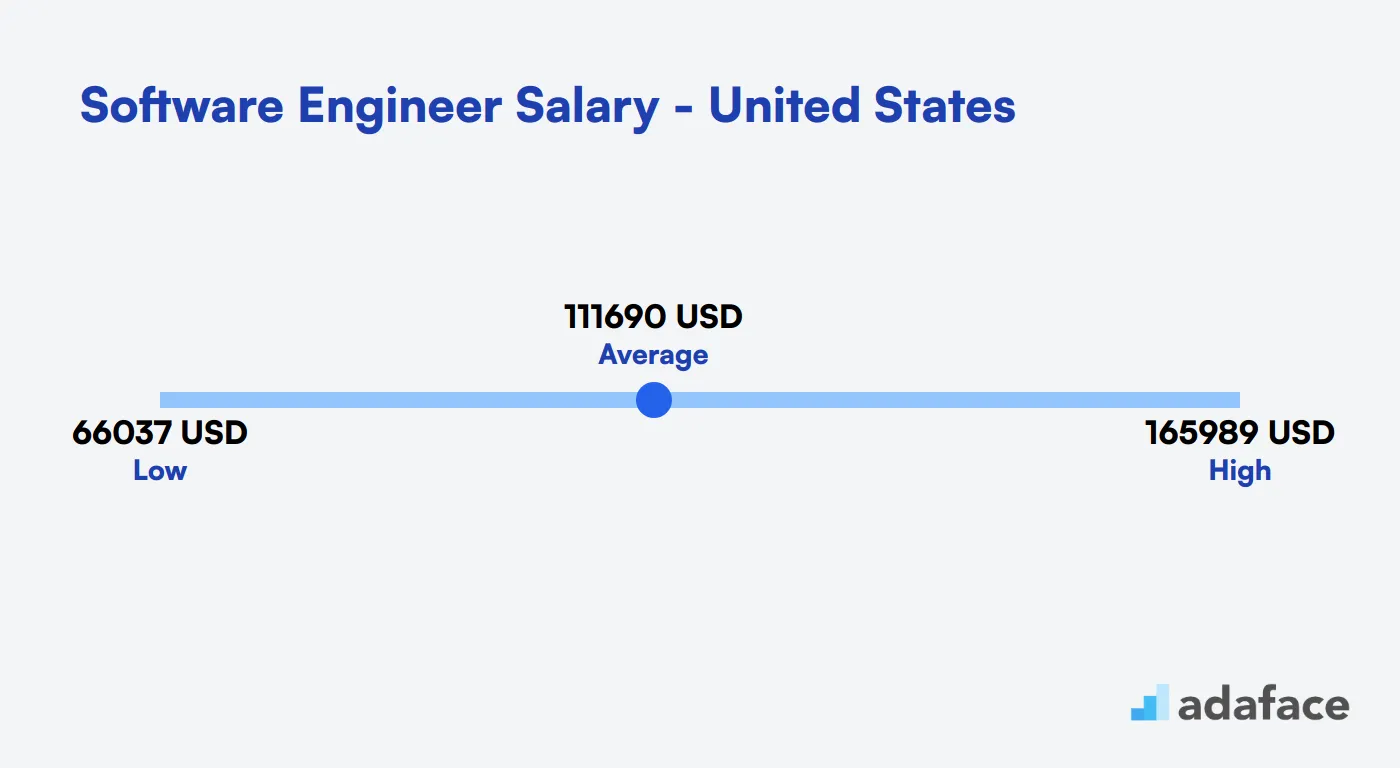
Software Engineer Salary in Australia
In Australia, the average salary for a Software Engineer is approximately AUD 106,000. Salaries can range from a low of around AUD 69,000 to highs exceeding AUD 147,000, depending on the location and level of experience. For instance, in major cities like Sydney and Melbourne, the average salaries are notably higher, reflecting the competitive job market.
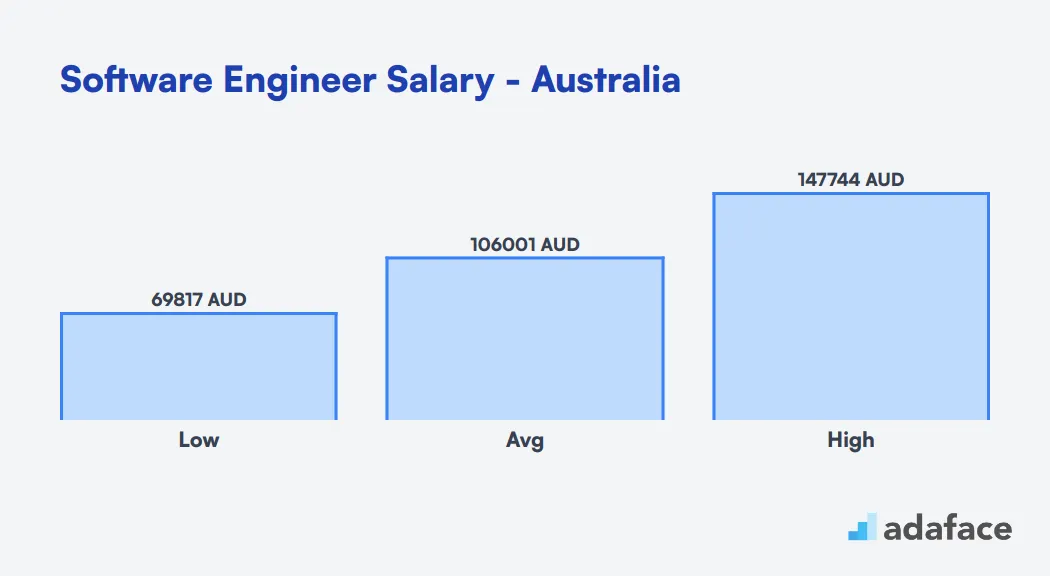
Software Engineer Salary in the Philippines
In the Philippines, Software Engineer salaries vary based on location and experience. The national average salary ranges from ₱124,171 to ₱686,299 per year, with a median of ₱291,922. Top-paying cities include Angeles, Makati, and Taguig, where experienced engineers can earn up to ₱1,170,922 annually.
Factors influencing salary include skills, company size, and industry demand. Entry-level positions typically start lower, while senior roles command higher pay. Keep in mind that these figures are general estimates and may fluctuate based on market conditions and individual qualifications.
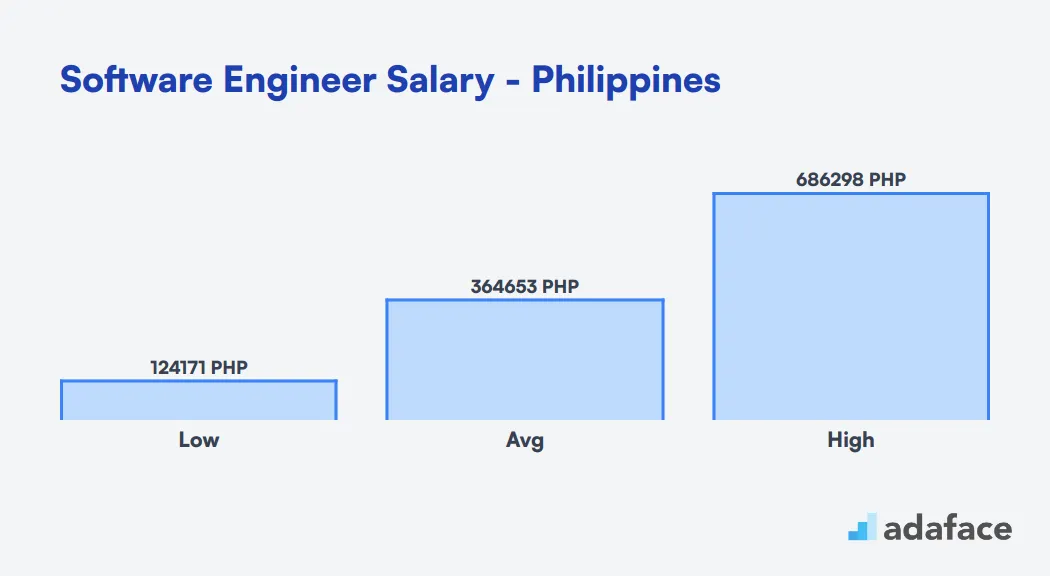
What's the difference between a Frontend Developer and a Backend Developer?
Frontend and backend developers often work closely together, but their roles and responsibilities are quite distinct. While both are essential for creating a functional website or application, they focus on different aspects of the development process.
Frontend developers are the architects of user experience. They work on the client-side of applications, using HTML, CSS, and JavaScript to create visually appealing and interactive interfaces. Their main goal is to ensure that users can easily navigate and interact with the website or application.
Backend developers, on the other hand, are the engine room operators. They focus on server-side logic, working with databases, APIs, and server management. Their primary responsibility is to ensure that the application functions smoothly behind the scenes, handling data processing and server operations.
Key differences between frontend and backend developers include:
- Languages: Frontend developers typically use HTML, CSS, and JavaScript, while backend developers work with languages like Java, Python, or Ruby.
- Frameworks: Frontend developers might use React or Angular, whereas backend developers often work with Django or Spring.
- Focus: Frontend developers prioritize design and user experience, while backend developers concentrate on data management and server-side logic.
- Tools: Frontend developers use tools like Webpack and NPM, while backend developers work with Docker and Jenkins.
- Skills: Frontend developers need creativity and UX sensibility, while backend developers require strong problem-solving and logical thinking skills.
| Frontend Developer | Backend Developer | |
|---|---|---|
| Main Focus | User Interface | Server-side Logic |
| Languages | HTML, CSS, JavaScript | Java, C#, Python, Ruby |
| Frameworks | React, Angular, Vue | Spring, .NET, Django |
| Tools | Webpack, NPM, Babel | Docker, Kubernetes, Jenkins |
| Education Requirement | CS Degree or Bootcamp | CS Degree or Experience |
| Responsibilities | Design, User Experience | Database, API Integration |
| Testing Tools | Jest, Mocha, Jasmine | JUnit, Postman, Newman |
| Soft Skills | Creativity, UX Sensibility | Problem Solving, Logical Thinking |
What are the ranks of Software Engineers?
In the world of software engineering, the hierarchy can sometimes be confusing for recruiters and hiring managers. Understanding the different ranks helps in making informed hiring decisions and setting clear expectations for each role.
- Junior Software Engineer: This is an entry-level position, typically for recent graduates or those with less experience. Junior engineers work under the guidance of senior team members, assisting with coding tasks and learning the ropes of software development. They often benefit from mentorship and are expected to grow their skills over time.
- Software Engineer: Often referred to simply as 'Software Engineer,' this role requires a solid understanding of programming principles and some industry experience. Engineers at this level are expected to handle projects independently while also collaborating with others. They contribute significantly to coding tasks, often taking on more complex assignments.
- Senior Software Engineer: Those in this position have extensive experience and deep technical expertise. Senior engineers lead projects, mentor junior staff, and handle high-level design and architecture tasks. They play a crucial role in decision-making processes and often have responsibilities that extend beyond coding.
- Lead Software Engineer: Acting as a bridge between technical teams and management, lead engineers oversee the software development lifecycle. They ensure that projects align with company goals and often coordinate with different departments. Their leadership and project management skills are key to driving team success.
- Principal Software Engineer: This is a high-level position focusing on strategic planning and innovation. Principal engineers are recognized experts in their field, often involved in setting long-term technical goals and exploring new technologies. Their work shapes the future direction of software projects and the company.
- Software Architect: Software architects design comprehensive systems and ensure they meet the organization's needs. Their role involves high-level planning and defining the structure of software solutions. They often collaborate closely with other technical leads to integrate various components into a seamless whole. For a detailed software architect job description, refer to our resources.
Hire Software Engineers with Precision
Throughout this post, we discussed the critical aspects of hiring software engineers, including understanding their roles, the hiring process, and the skills and qualifications needed. We also explored writing effective job descriptions, platforms for hiring, and screening resumes, along with technical assessments and interview structuring.
If there's one takeaway, it's the importance of crafting precise job descriptions and using skills tests for effective hiring. These steps can help you identify the right candidates for your needs. You might consider exploring our software engineering online test to assess technical skills accurately.
Software Engineering Online Test
FAQs
A software engineer is responsible for designing, developing, testing, and maintaining software applications. They work on both the front end and back end, collaborate with cross-functional teams, and solve complex problems.
Look for relevant technical skills, experience in similar projects, and an understanding of the programming languages pertinent to your needs. Pay attention to the logical progression of their work and any contributions to open source or personal projects.
Consider using coding assessments to evaluate programming skills and problem-solving abilities. Online platforms offer tests for languages such as Python, JavaScript, and Java. A practical task related to real-world problems is also beneficial.
Start with a mix of technical questions to gauge their problem-solving and coding skills. Include a live coding session, scenario-based questions, and discussions about past projects to assess their expertise and thought process.
A good case study should reflect real-world problems your company faces. It should test their ability to design a solution, articulate their approach, and showcase their coding skills. Ensure it aligns with the technologies you use.
Look for candidates who not only possess technical skills but also have a cultural fit with your team. Evaluate their communication skills, team collaboration ability, and passion for continuous learning.
Skilled software engineers can be found on platforms like GitHub, Stack Overflow, LinkedIn, and specialized job boards. Networking events, hackathons, and university collaborations are also effective ways to find talent.

40 min skill tests.
No trick questions.
Accurate shortlisting.
We make it easy for you to find the best candidates in your pipeline with a 40 min skills test.
Try for freeRelated posts
Free resources



